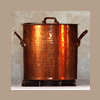-
Welcome to the eG Forums, a service of the eGullet Society for Culinary Arts & Letters. The Society is a 501(c)3 not-for-profit organization dedicated to the advancement of the culinary arts. These advertising-free forums are provided free of charge through donations from Society members. Anyone may read the forums, but to post you must create a free account.
More Food Terms We Loathe/Misuse
-
Similar Content
-
- 17 replies
- 6,890 views
-
- 11 replies
- 901 views
-
- 258 replies
- 16,952 views
-
- 32 replies
- 7,502 views
-
- 32 replies
- 7,502 views
-
-
Recently Browsing 0 members
- No registered users viewing this page.






Recommended Posts